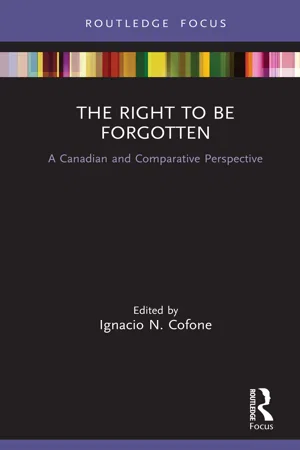
The Right to be Forgotten
A Canadian and Comparative Perspective
- 122 pages
- English
- ePUB (mobile friendly)
- Available on iOS & Android
The Right to be Forgotten
A Canadian and Comparative Perspective
About This Book
Exploring the evolution of the right to be forgotten, its challenges, and its impact on privacy, reputation, and online expression, this book lays out the current state of the law on the right to be forgotten in Canada and in the international context while addressing the broader theoretical tensions at its core.
The essays contemplate questions such as: How does the right to be forgotten fit into existing legal frameworks? How can Canadian courts and policy-makers reconcile rights to privacy and rights to access publicly available information? Should search engines be regulated purely as commercial actors? What is the right's impact on free speech and freedom of the press? Together, these essays address the questions that legal actors and policy-makers must consider as they move forward in shaping this new right through legislation, regulations, and jurisprudence. They address both the difficulties in introducing the right and the long-term effects it could have on the protection of online (and offline) reputation and speech. As the question of implementing the right to be forgotten in Canada has been put forward by the Privacy Commissioner and considered by courts, Canada is in need of academic literature on the matter; a need that, with this book, we intend to fulfill.
The questions put forward in this book will thus advance the legal debate in Canada and provide a rich case study for the international legal community.
Frequently asked questions
1 Online harms and the right to be forgotten
1 Introduction
2 What is the right to be forgotten?
Table of contents
- Cover
- Half Title
- Title Page
- Copyright Page
- Table of Contents
- Acknowledgments
- List of contributors
- 1 Online harms and the right to be forgotten
- 2 Lost in translation: transposing the right to be forgotten from different legal systems
- 3 A little knowledge is a dangerous thing?: information asymmetries and the right to be forgotten
- 4 Reconciling privacy and expression rights by regulating profile compilation services
- 5 Let’s not dwell on the past: the right to be forgotten as more than a romantic revolution
- 6 The right to be forgotten in peace processes
- Bibliography
- Index